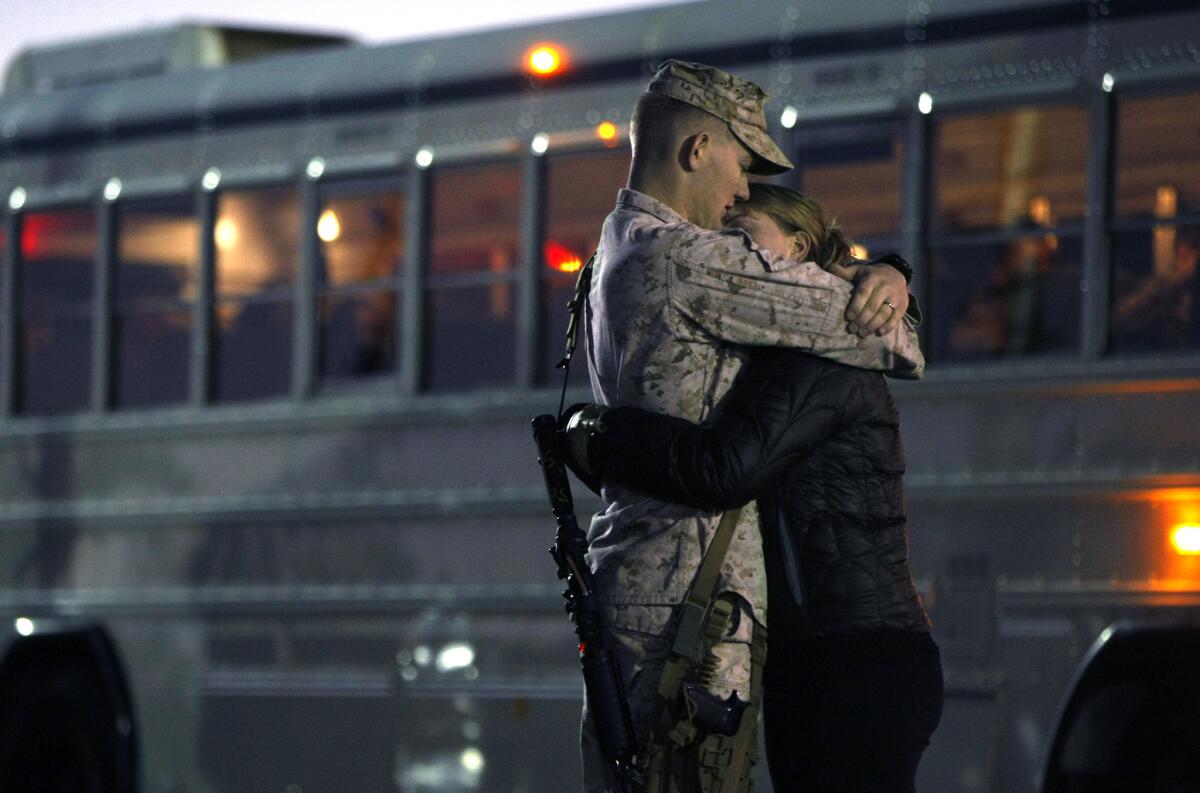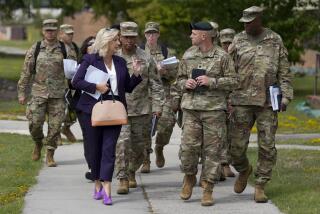Families say goodbye to Marines, sailors headed for Afghanistan

- Share via
CAMP PENDLETON, Calif. -- One thing has always been true for 12-year-old Haleigh Cook-Watt: Dad periodically leaves home to spend months in some of the most dangerous places in the world.
And so the pre-dawn departure Monday morning of Gunnery Sgt. Dylin Cook-Watt and 140 other Marines and sailors for Afghanistan was familiar for Haleigh, 7-year-old Jamie, and their mother, Samantha Cook-Watt.
Still, the leave-taking, while sad and fraught with uncertainty, had a different feel this time: The Marines are now allowing Afghan forces to take the lead in fighting a resurgent Taliban in Helmand and Nimroz provinces. Whether the Afghans will prove equal to the task is unknown.
By the end of the year, U.S. combat forces are set to be out of Afghanistan -- after a 13-year war that began after the Sept. 11, 2001, terrorist attacks on the United States.
“The Marines are packing up the stuff, we’re finished over there,” Haleigh explained. “They’re not doing the fighting anymore and that’s good.”
In coming weeks, 4,000-plus Marines and sailors of the 1st Marine Expeditionary Force will depart for Afghanistan from this sprawling base. Some will spend a year in Afghanistan; others, depending on their job descriptions, seven months.
Unless the commander-in-chief decides otherwise, this should be the last large-scale group of Marines, and the last Marine command presence, deployed to Afghanistan.
“You guys are sort of ending the game,” Lt. Gen. John Toolan, who led combat troops in Afghanistan and Iraq and is now commanding general 1MEF, told the assemblage. “We’ve worked very hard.”
Because the Afghans are now in the lead, that does not mean the deployment will be easy, Toolan warned the Marines and sailors before they prepared to board buses for March Air Reserve Base in Riverside. From there a plane was scheduled to take them to Afghanistan.
Toolan said the troops need to remember the Marines’ “flat ass rules” promulgated during the fighting in Iraq. Among those rules: protect your buddy, follow orders, and make sure any attack on Marines results in “the swift and immediate death of the enemy threat.”
Whether some Marines and soldiers will remain to train and support Afghan troops after this year depends on whether an agreement can be reached between the U.S. and the often unpredictable Afghan President Hamid Karzai.
For Marine brass, the talk is no longer of unalloyed victory but of finishing a mission and turning responsibility over to the Afghans. That was the message from Commandant Gen. James Amos when he visited Marines at Camp Leatherneck in Afghanistan last month.
“We will have done everything we can, everything we can, to give this country the opportunity to succeed,” Amos told the Marines. “Only history is going to tell whether or not they seize that opportunity. I am optimistic, but the one thing I feel damn good about regardless of what happens — we will have completed the mission.”
For some of the Marines at Camp Pendleton, this will be their first war-zone deployment. They were still in elementary school on 9/11 and the months afterward when Marines from Camp Pendleton were among the first conventional U.S. forces to arrive in Afghanistan.
“We should be the last ones over there,” said Cpl. Favian Ramirezbenitez, 20, whose parents had come from Phoenix for the farewell.
For other Marines, the deployments to Iraq, Afghanistan and elsewhere have been so numerous that they have lost count, although often the stay-behind spouse has an exact number.
“It never gets easier,” said Christi Fedak, 30, whose husband is 2nd Lt. Patrick Fedak, as she sheltered their 3-year-old son, Austin, from the morning chill. “The children get older and the questions begin about Daddy being gone.”
There are support programs and “family readiness” officers to assist the coping process. Contact with a deployed spouse is possible through email and Skype -- unlike the “old days” when Marines and sailors would deploy for months without a way to communicate.
But even with those modern innovations, each spouse must find the individual resilience to deal with stress and loneliness and fears of the children.
“They’ve been called to serve something bigger than themselves and we have to support them,” said Dee Hunt, 42, as tears filled her eyes. Her husband, Navy Cmdr. Ray Hunt, is a Baptist chaplain who accompanies troops to the frontlines.
Telani Mcclelland, 45, whose husband, Master Gunnery Sgt. William Mcclelland, has done 10 deployments, had some tough-love advice for spouses.
“Suck it up, buttercup, you’re married to a Marine,” she said as her husband boarded the bus.
Twitter: @LATsandiego
More to Read
Sign up for Essential California
The most important California stories and recommendations in your inbox every morning.
You may occasionally receive promotional content from the Los Angeles Times.









